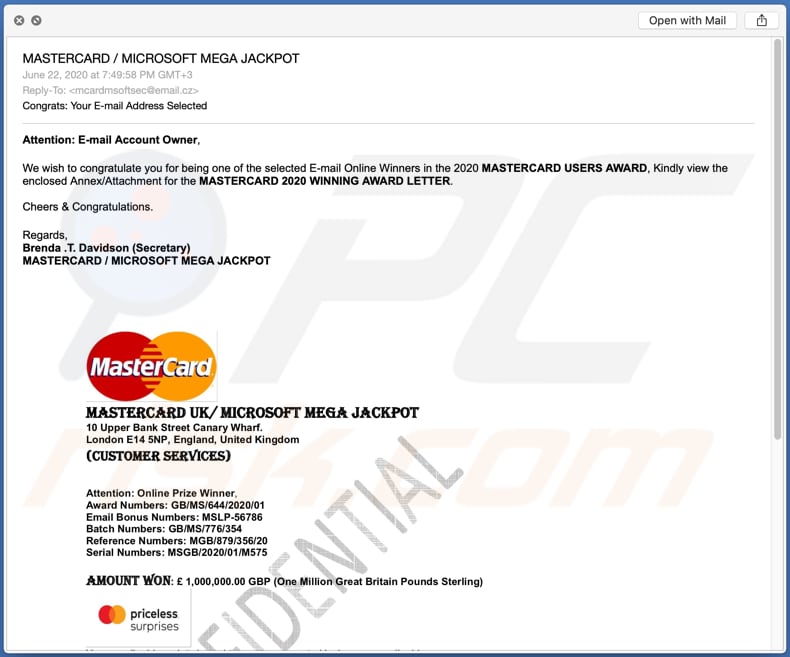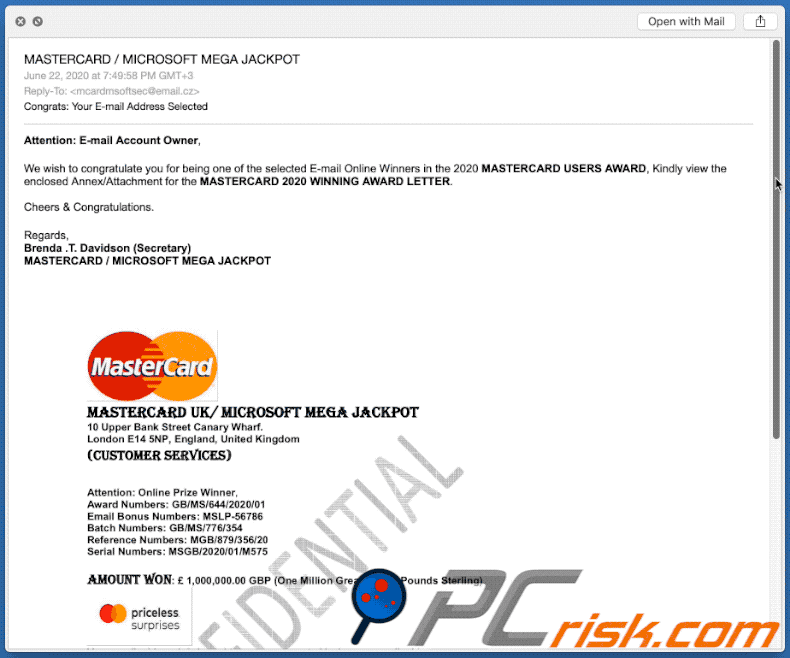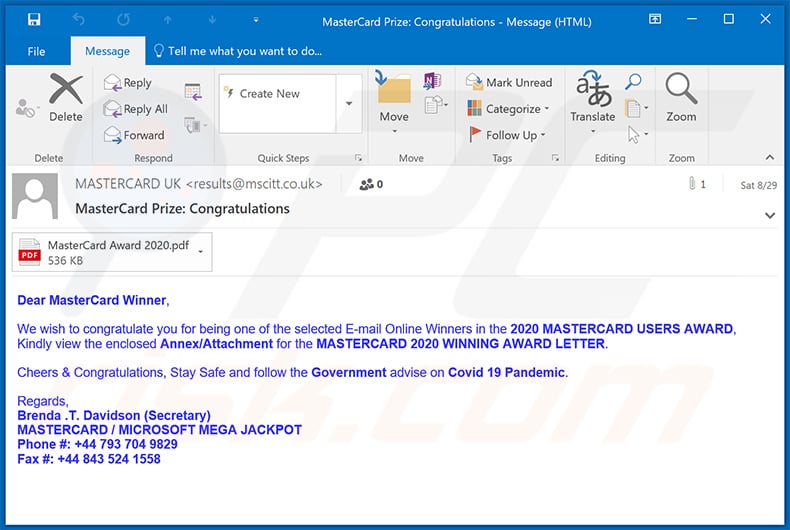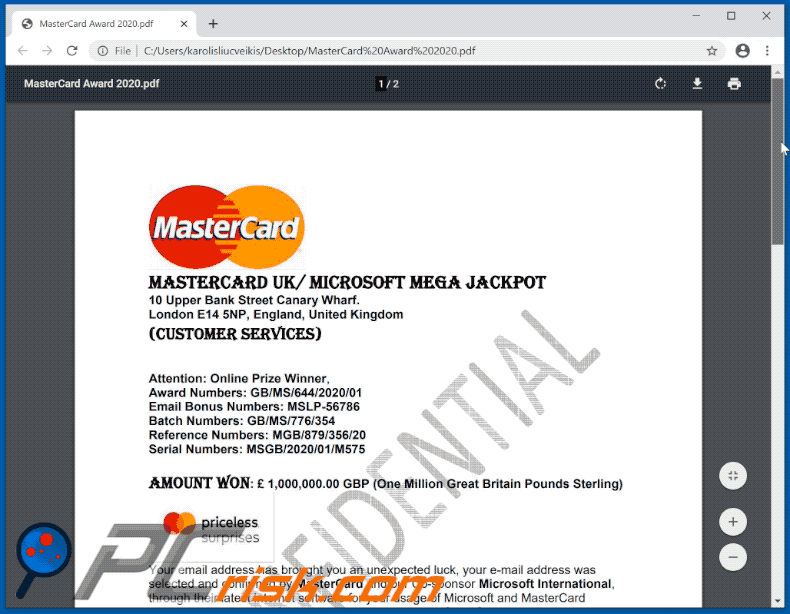Avoid the 2020 MASTERCARD USERS AWARD email scam
Phishing/ScamAlso Known As: 2020 MASTERCARD USERS AWARD spam
Get free scan and check if your device is infected.
Remove it nowTo use full-featured product, you have to purchase a license for Combo Cleaner. Seven days free trial available. Combo Cleaner is owned and operated by RCS LT, the parent company of PCRisk.com.
What kind of email is "2020 MASTERCARD USERS AWARD"?
Typically, scammers behind phishing emails seek to trick recipients into divulging various personal information. For example, passwords (login credentials), credit card details, and/or transferring certain sums of money.
Scammers send this particular email to deceive people into believing that their email address was selected as a winner of a "2020 MASTERCARD USERS AWARD" lottery.

"2020 MASTERCARD USERS AWARD" email scam overview
This scam email states that recipients can get information about how to claim the prize (one million GBP) by sending an email to financemgroupsuk@outlook.com. It is very likely that when these scammers are contacted, they will try to trick recipients into believing that the aforementioned prize can be claimed by paying a bank fee (or other fee).
They might also ask for various personal information such as credit card details, account numbers, passwords, etc.
If they acquire this information, they could gain access to email/bank accounts (and others) and misuse them to make fraudulent purchases and transactions, steal identities, spread this spam campaign further, and send other emails for other malicious purposes.
You are strongly advised not to trust these emails. Note that scammers often try to make their emails seem more believable and less suspicious by exploiting names of well-known companies such as in this case with Mastercard and Microsoft.
| Name | 2020 MASTERCARD USERS AWARD Email Scam |
| Threat Type | Phishing, Scam, Social Engineering, Fraud. |
| Fake Claim | Scammers claim that recipients have won a million pounds (GBP). |
| Cyber Criminal Contact | financemgroupsuk@outlook.com |
| Disguise | This email is disguised as a message from the Mastercard finance director. |
| Symptoms | Unauthorized online purchases, changed online account passwords, identity theft, illegal access of the computer. |
| Distribution methods | Deceptive emails, rogue online pop-up ads, search engine poisoning techniques, misspelled domains. |
| Damage | Loss of sensitive private information, monetary loss, identity theft. |
| Malware Removal (Windows) |
To eliminate possible malware infections, scan your computer with legitimate antivirus software. Our security researchers recommend using Combo Cleaner. Download Combo CleanerTo use full-featured product, you have to purchase a license for Combo Cleaner. 7 days free trial available. Combo Cleaner is owned and operated by RCS LT, the parent company of PCRisk.com. |
Spam campaigns in general
More examples of email scams are "Suspicious Sign-In Attempt Prevented Email Scam", "Important: You Have 19 Pending Incoming Email(s) Email Scam" and "Dropbox Email Scam". Recipients who trust such emails often become victims of identity theft, lose money and/or access to personal accounts, or even infect their computers with malware.
Cyber criminals commonly send emails that contain a malicious attachment or a link to a download page for the malicious file in order to trick recipients into opening it. When opened, the malicious file installs malware. Some examples of malware that is distributed in this way includes FormBook, TrickBot, LokiBot, and Adwind.
How do spam campaigns infect computers?
Computers become infected with malware through emails when cyber criminals successfully deceive recipients into opening/executing a malicious attachment, or a file downloaded from a malicious website.
Some examples of files that cyber criminals attach to their emails are malicious PDF, Microsoft Office documents, archive files (like RAR, ZIP), executable files (.exe) and JavaScript files. Note that malicious MS Office documents infect operating systems only when users give them permission to enable editing/content (macros commands).
This applies only to documents opened with MS Office 2010 or newer versions. Older versions do not have the "Protected View" feature and infect systems without asking any permission.
How to avoid installation of malware
Software should be downloaded only from official pages and via direct links. Peer-to-Peer networks (torrent clients, eMule), unofficial websites, third party downloaders, etc., should not be used. Third party installers should also be avoided.
Operating systems and installed programs must be updated and activated only with implemented functions and tools designed by the official developers. Third party, unofficial activators ('cracking') and updaters can be designed to install malware. Furthermore, it is illegal to activate licensed software with third party tools.
Attachments and links in irrelevant emails that are received from suspicious, unknown addresses should not be opened. Commonly, these emails are sent by cyber criminals who attempt to spread malware. Note that the emails are often disguised as important, official, and so on.
Finally, you are advised to have reputable antivirus or anti-spyware software installed on the computer and to scan the system with it regularly. Keep this software up to date. If you have already opened malicious attachments, we recommend running a scan with Combo Cleaner Antivirus for Windows to automatically eliminate infiltrated malware.
Appearance of the 2020 MASTERCARD USERS AWARD email scam:

Text presented in this email:
Subject: Congrats: Your E-mail Address Selected
Attention: E-mail Account Ownerm
We wish to congratulate you for being one of the selected E-mail Online WInners in the 2020 MASTERCARD USERS AWARD, Kindly view the enclosed Annex/Attachment for the MASTERCARD 2020 WINNING AWARD LETTER.
Cheers & Congratulations.
Regards,
Brenda .T.Davidson (Secretary)
MASTERCARD / MICROSOFT MEGA JACKPOTMasterCard
MASTERCARD UK/ MICROSOFT MEGA JACKPOT
10 Upper Bank Street Canary Wharf.
London E14 5NP, England, United Kingdom
(CUSTOMER SERVICES)
Attention: Online Prize Winner.
Award Numbers: GB/MS/644/2020/01
Email Bonus Numbers: MSLP-56786
Batch Numbers: GB/MS/776/354
Reference Numbers: MGB/879/356/20
Serial Numbers: MSGB/2020/01/M575
AMOUNT WON: £ 1,000,000.00 GBP (One Million Great Britain Pounds Sterling)
priceless
surprises
Your email address has bruoght you an unexpected luck, your e-mail address was selected and confirmed by MasterCard and our Co-sponsor Microsoft International, through their latest internet software for your usage of Microsoft and MasterCard products. You are therefore been approved by MasterCard GB International/Microsoft UK the sum of £ 1,000,000.00 GBP (One Million Gread Britain Pounds Sterling).
CONTACT MASTERCARD FINANCE DIRECTOR
mastercard
Name: Phill Barkley
Email:
financemgroupsuk@outlook.com
Phone #: +44 793 704 9829
Fax #: +44 843 524 1558
Do email the above MasterCard Finance Director, at once with all the claims requirements below. To avoid unnecessary delay, they are needed to proceed.
Another variant of "2020 MASTERCARD USERS AWARD" scam email:

Text presented within:
Subject: MasterCard Prize: Congratulations
Dear MasterCard Winner,
We wish to congratulate you for being one of the selected E-mail Online Winners in the 2020 MASTERCARD USERS AWARD, Kindly view the enclosed Annex/Attachment for the MASTERCARD 2020 WINNING AWARD LETTER.
Cheers & Congratulations, Stay Safe and follow the Government advise on Covid 19 Pandemic.
Regards,
Brenda .T. Davidson (Secretary)
MASTERCARD / MICROSOFT MEGA JACKPOT
Phone #: +44 793 704 9829
Fax #: +44 843 524 1558
Appearance of the attached PDF document (GIF):

Text presented within:
MASTERCARD UK/ MICROSOFT MEGA JACKPOT
10 Upper Bank Street Canary Wharf.
London E14 5NP, England, United Kingdom
(CUSTOMER SERVICES)
Attention: Online Prize Winner,
Award Numbers: GB/MS/644/2020/01
Email Bonus Numbers: MSLP-56786
Batch Numbers: GB/MS/776/354
Reference Numbers: MGB/879/356/20
Serial Numbers: MSGB/2020/01/M575
AMOUNT WON: £ 1,000,000.00 GBP (One Million Great Britain Pounds Sterling)
Your email address has brought you an unexpected luck, your e-mail address was
selected and confirmed by MasterCard and our Co-sponsor Microsoft International,
through their latest internet software for your usage of Microsoft and MasterCard
products. You are therefore been approved by MasterCard GB
International/Microsoft UK the sum of £ 1,000,000.00 GBP (One Million Great
Britain Pounds Sterling).
CONTACT MASTERCARD FINANCE DIRECTOR
Name: Phillip Barkley
Email: Phillip@mcardmgbgroups.com
Email: financemgroupsuk@outlook.com
Phone #: +44 793 704 9829
Fax #: +44 843 524 1558
Do email the above MasterCard Finance Director, at once with all the claims
requirements below. To avoid unnecessary delay, they are needed to proceed.
MASTERCARD VERIFICATION REQUIREMENTS
(1). Full Name
(2). Address
(3). Nationality/Gender
(4). Date of Birth
(5). Occupation
(6). Phone
(7). Country
(8). How do you feel as a MasterCard Winner
(9). Ever Won an Online Award or Bonus
(10). Winning Email Address
PROCEEDURES / RIGHTS AND PRECAUTIONS. To fill the Microsoft Verification Requirements, if you are not use to
Microsoft/Pdf files, you can print it out and fill it or simply copy the entire Award
Notification Attachment to your new message in your email box or notepad for
easy access.
Contact the Finance Director with all your Microsoft Verification
Requirements well filled.
Sincerely,
Brenda .T. Davidson (Secretary)
Instant automatic malware removal:
Manual threat removal might be a lengthy and complicated process that requires advanced IT skills. Combo Cleaner is a professional automatic malware removal tool that is recommended to get rid of malware. Download it by clicking the button below:
DOWNLOAD Combo CleanerBy downloading any software listed on this website you agree to our Privacy Policy and Terms of Use. To use full-featured product, you have to purchase a license for Combo Cleaner. 7 days free trial available. Combo Cleaner is owned and operated by RCS LT, the parent company of PCRisk.com.
Quick menu:
- What is 2020 MASTERCARD USERS AWARD spam?
- Types of malicious emails.
- How to spot a malicious email?
- What to do if you fell for an email scam?
Types of malicious emails:
![]() Phishing Emails
Phishing Emails
Most commonly, cybercriminals use deceptive emails to trick Internet users into giving away their sensitive private information, for example, login information for various online services, email accounts, or online banking information.
Such attacks are called phishing. In a phishing attack, cybercriminals usually send an email message with some popular service logo (for example, Microsoft, DHL, Amazon, Netflix), create urgency (wrong shipping address, expired password, etc.), and place a link which they hope their potential victims will click on.
After clicking the link presented in such email message, victims are redirected to a fake website that looks identical or extremely similar to the original one. Victims are then asked to enter their password, credit card details, or some other information that gets stolen by cybercriminals.
![]() Emails with Malicious Attachments
Emails with Malicious Attachments
Another popular attack vector is email spam with malicious attachments that infect users' computers with malware. Malicious attachments usually carry trojans that are capable of stealing passwords, banking information, and other sensitive information.
In such attacks, cybercriminals' main goal is to trick their potential victims into opening an infected email attachment. To achieve this goal, email messages usually talk about recently received invoices, faxes, or voice messages.
If a potential victim falls for the lure and opens the attachment, their computers get infected, and cybercriminals can collect a lot of sensitive information.
While it's a more complicated method to steal personal information (spam filters and antivirus programs usually detect such attempts), if successful, cybercriminals can get a much wider array of data and can collect information for a long period of time.
![]() Sextortion Emails
Sextortion Emails
This is a type of phishing. In this case, users receive an email claiming that a cybercriminal could access the webcam of the potential victim and has a video recording of one's masturbation.
To get rid of the video, victims are asked to pay a ransom (usually using Bitcoin or another cryptocurrency). Nevertheless, all of these claims are false - users who receive such emails should ignore and delete them.
How to spot a malicious email?
While cyber criminals try to make their lure emails look trustworthy, here are some things that you should look for when trying to spot a phishing email:
- Check the sender's ("from") email address: Hover your mouse over the "from" address and check if it's legitimate. For example, if you received an email from Microsoft, be sure to check if the email address is @microsoft.com and not something suspicious like @m1crosoft.com, @microsfot.com, @account-security-noreply.com, etc.
- Check for generic greetings: If the greeting in the email is "Dear user", "Dear @youremail.com", "Dear valued customer", this should raise suspiciousness. Most commonly, companies call you by your name. Lack of this information could signal a phishing attempt.
- Check the links in the email: Hover your mouse over the link presented in the email, if the link that appears seems suspicious, don't click it. For example, if you received an email from Microsoft and the link in the email shows that it will go to firebasestorage.googleapis.com/v0... you shouldn't trust it. It's best not to click any links in the emails but to visit the company website that sent you the email in the first place.
- Don't blindly trust email attachments: Most commonly, legitimate companies will ask you to log in to their website and to view any documents there; if you received an email with an attachment, it's a good idea to scan it with an antivirus application. Infected email attachments are a common attack vector used by cybercriminals.
To minimise the risk of opening phishing and malicious emails we recommend using Combo Cleaner Antivirus for Windows.
Example of a spam email:

What to do if you fell for an email scam?
- If you clicked on a link in a phishing email and entered your password - be sure to change your password as soon as possible. Usually, cybercriminals collect stolen credentials and then sell them to other groups that use them for malicious purposes. If you change your password in a timely manner, there's a chance that criminals won't have enough time to do any damage.
- If you entered your credit card information - contact your bank as soon as possible and explain the situation. There's a good chance that you will need to cancel your compromised credit card and get a new one.
- If you see any signs of identity theft - you should immediately contact the Federal Trade Commission. This institution will collect information about your situation and create a personal recovery plan.
- If you opened a malicious attachment - your computer is probably infected, you should scan it with a reputable antivirus application. For this purpose, we recommend using Combo Cleaner Antivirus for Windows.
- Help other Internet users - report phishing emails to Anti-Phishing Working Group, FBI’s Internet Crime Complaint Center, National Fraud Information Center and U.S. Department of Justice.
Frequently Asked Questions (FAQ)
Why did I receive this email?
Even if they include information relevant to the recipients, spam emails are not personal. Thousands of users receive identical mail because cyber criminals are hoping that at least some of the recipients will fall for their scams.
I have provided my personal information when tricked by this spam email, what should I do?
If you have provided your log-in credentials – change the passwords of all potentially exposed accounts and inform their official support without delay. However, if the disclosed information was of a different personal nature (e.g., ID card details, credit card numbers, etc.) – immediately contact relevant authorities.
I have read a spam email but didn't open the attachment, is my computer infected?
Reading an email is harmless; devices are infected when malicious attachments or links are opened/clicked.
I have downloaded and opened a file attached to a spam email, is my computer infected?
If the opened file was an executable (.exe, .run, etc.) – it is most likely the case that your device was infected. However, you might have avoided the infection if it was a document (.doc, .xls, .pdf, etc.). These formats may need extra actions (e.g., enabling macro commands, clicking embedded content, etc.) to begin malware download/installation.
Will Combo Cleaner remove malware infections present in email attachments?
Yes, Combo Cleaner is designed to scan computers and eliminate all manner of threats. It can detect and remove most of the known malware infections. Note that since sophisticated malicious software tends to hide deep within systems – performing a complete system scan is paramount.
Share:

Tomas Meskauskas
Expert security researcher, professional malware analyst
I am passionate about computer security and technology. I have an experience of over 10 years working in various companies related to computer technical issue solving and Internet security. I have been working as an author and editor for pcrisk.com since 2010. Follow me on Twitter and LinkedIn to stay informed about the latest online security threats.
PCrisk security portal is brought by a company RCS LT.
Joined forces of security researchers help educate computer users about the latest online security threats. More information about the company RCS LT.
Our malware removal guides are free. However, if you want to support us you can send us a donation.
DonatePCrisk security portal is brought by a company RCS LT.
Joined forces of security researchers help educate computer users about the latest online security threats. More information about the company RCS LT.
Our malware removal guides are free. However, if you want to support us you can send us a donation.
Donate
▼ Show Discussion